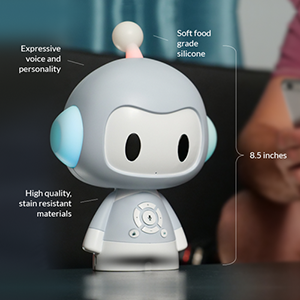Designing and marketing a consumer robot has been difficult enough in the past few years. While the COVID-19 pandemic has increased demand for ways to entertain and educate children, it has not made development or production easier. Roybi Inc. has relaunched its Roybi robot and launched the DOCBI model in the midst of current challenges.
“Robots will not be able to replace humans, but they will enhance the quality of our lives by assisting us in ways that were not possible in the past,” said Elnaz Sarraf, founder and CEO of Roybi. “One teacher in a classroom with over 20 to 30 students cannot divide enough attention to each child individually. At the same time, with a robot, a teacher can personalize lessons and exercises based on each student’s needs.”
Roybi was founded in 2017 and employs about 22 people. The Mountain View, Calif.-based startup raised seed funding of $4.2 million in July 2019.
Roybi designed for interactivity
“There’s nothing like Roybi on the market,” claimed Sarraf, a serial entrepreneur and a board member on the Consumer Technology Association’s Small Business Council. “We wanted it to use voice recognition and a camera to initiate conversation, detect a child’s emotional state, and continue interaction.”
The educational robot was first launched last October, and Time magazine named Roybi one of the best inventions of 2019. The robot uses artificial intelligence and facial recognition to interact with up to three users, said the company.
Roybi also has more than 500 lessons that can be personalized based on an individual’s learning pace and interests, Sarraf told The Robot Report. It is intended to entertain and teach languages and basic STEM (science, technology, engineering, and mathematics) concepts to children ages 3 and up.
Content in the cloud
“Content is pushed out over the cloud, with a series of lessons to practice,” explained Sarraf. “They’re currently in English, and we’ll soon add Mandarin. Connecting to the cloud can be challenging, so in February, we acquired technology from KidSense.ai for edge AI and ASR [automatic speech recognition].”
“So even on an airplane, kids can play with Roybi,” she said. “We’ve added over five years of data from 150,000 children.”
What’s the difference between Roybi and a smartphone? “The difference is that right now, taking kids off of large displays is a pain point for parents,” Sarraf replied. “Our robot has true AI to understand what children say. Most phone apps are based on games. Roybi also has a face and emotion detection.”
“The robot can also provide reports on a child’s progress for parents and educators,” she said. “After more development, we relaunched the product with retailers in May, and it’s available for order with Amazon, Walmart, and Best Buy Canada, among others.”
Roybi is also aware of the need to protect families’ privacy. “We hired companies and attorneys to help,” said Sarraf. “We do not record anything. That’s one reason we acquired KidSense.ai — it had gained permission from users to build their data for training.”
“We get parents’ consent before they even install Roybi. Its camera comes with a privacy cover — they can turn video on and off,” she added. “We store our information on Amazon Web Services, which is a powerful platform. We worked with Amazon’s team to help with security. Our privacy policy is completely transparent and is on our Web site.”
Roybi pushes down the price point to compete
Rather than be mobile, Roybi’s robots are designed to be portable, in part to keep its price under $200, much less than most other social robots, said Sarraf.
DOCBI quickly prepared during the pandemic
In April, Roybi Robot launched DOCBI, a “scientist friend” companion robot developed in accordance with recommendations from the Center for Disease Control and Prevention and the World Health Organization. The robot was built in just three weeks to address the stress and social needs of children during the COVID-19 pandemic.



